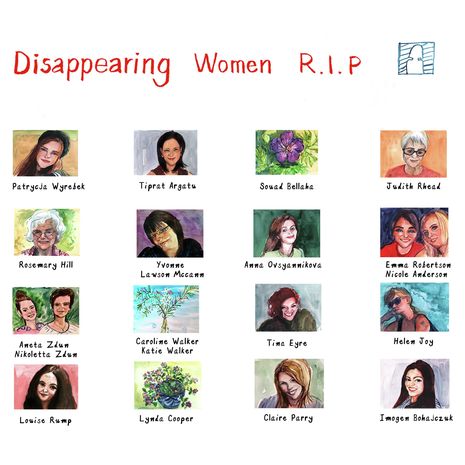Henny Beaumont’s ‘Disappearing Women’
In her first piece of the term, columnist Eleanor Antoniou contemplates the potency of feminist art in reclaiming the narratives surrounding male violence

Content Note: This article contains detailed discussion of violence against women.
Parliament sits in a haunting silence as MP Jess Phillips reads out a list of the names of the 118 women whose lives were taken by male violence between the 11th March 2020 and the 11th March 2021. It takes her five minutes to read through the whole list and it is received with a deeply uncomfortable silence which echoes with unsaid meaning. The message of Phillips’ speech, which she read out in parliament during the International Women’s Day debate last March, was clear: “Dead women is a thing we’ve all just accepted as part of our daily lives… Killed women are not vanishingly rare, killed women are common.”
Despite this, I had only heard a couple of these women’s names before. And even though so many have already died, the problem continues incessantly. During the trial of Sarah Everard’s killer in September, I felt angered at the way newspapers were talking about him: some even seemed to try and defend him, or romanticise him, as a great friend or a caring father. His image was splashed across every news site, his menacing eyes so often placed right next to Sarah’s smiling face, a face he didn’t ever deserve to have been connected with.
“She fights for women’s rights through her watercolours and brings the women we have lost into visibility once more”
In my anger and sadness, I came across Beaumont’s portrait series, Disappearing Women, which has stayed with me ever since, like no other piece of art ever has. After hearing Phillips’ speech, Beaumont realised how many women’s deaths are going unnoticed, how many women are fading away, killed at the hands of men, whilst nothing is done to stop this. Through her art, she exposes the problem; she fights for women’s rights through her watercolours and brings the women we have lost into visibility once more. Her completed project displays the portraits of each of the 118 women on Phillips’ list, each painted with grief, love, and the solidarity of all women who have felt scared to walk home alone. Where no image was available, Beaumont painted flowers in honour of the woman’s life.
Whether you saw the installation in person at The Other Art Fair in October, or whether you are viewing the series on Beaumont’s website or Instagram page, the sheer number of portraits is what will shock you first. Scrolling down her page can feel neverending and overwhelming - how can all these women be dead at the hands of male violence? The number of portraits is uncomfortable, and so it should be. The images show that these women are not just names or a number, but “real people who lost their lives”, as Beaumont explains.
DR. Saman Mir Sacharvi RIP💔
- henny beaumont (@HennyBeaumont) June 9, 2021
14yr old daughter Vian Mangrio RIP💔
I’m painting the 118 women killed by men last year named by @jessphillips to remember, honour & make these women visible pls RT/ donate https://t.co/u4wUjjwLo5 @centreWJ @femicidecensus #EndViolenceAgainstWomen pic.twitter.com/jA9r8hyQHY
Her collection also questions why some women are remembered more than others, exposing the ‘missing white woman syndrome’ which all too often means that a blind eye is turned towards women of colour who are also lost. Beaumont’s series remembers them all: bright watercolours in an array of hues, each aglow with life, no matter the woman’s race. Crucially, in Beaumont’s work, every woman is remembered for her life, rather than for her death.
“Beaumont proves the potentiality in the power of feminist art”
The portrait of each woman is presented as a short video, which shows her appearing as the painting is created: she comes to life in the soft brush strokes and the vibrant paint colours, which come to symbolise her vitality, her beautiful life. Many of the women are smiling, they gleam with happiness as they look out at the viewer. But this juxtaposes harshly with the truth behind the collection and the patriarchal reality that led to the tragic loss of the women we are looking at here. As each video continues to play, the woman in the picture begins to fade, disappearing slowly as the creation of the painting is played back in reverse now. It ends with a blank screen. The woman has vanished. Only her name remains behind, its significance haunting and brutal against the emptiness of the white background. This is what she has been reduced to: a name on a long list of victims.
Beaumont has created something that is simultaneously beautiful and horrifying, but eternally moving. Her paintings allow these women to be remembered for more than their names. It is heartbreaking that these paintings are necessary, but they are undeniably essential for remembering these women with the respect they deserve and for fighting against the male violence pandemic. Last week, the death of Ashling Murphy was another reminder of this disturbing reality.
Patriarchal systems may fail women, but Beaumont proves the potentiality in the power of feminist art. Her paintings reclaim a narrative that stands up for women’s rights, when words have failed to do so. Like Philomela of ancient mythology, who reclaimed her own story of gendered violence through her art, Beaumont too uses visual images to speak a message that has gone unheard for too long.
 News / Hundreds of Cambridge academics demand vote on fate of vet course20 February 2026
News / Hundreds of Cambridge academics demand vote on fate of vet course20 February 2026 News / University Council rescinds University Centre membership20 February 2026
News / University Council rescinds University Centre membership20 February 2026 News / Judge Business School advisor resigns over Epstein and Andrew links18 February 2026
News / Judge Business School advisor resigns over Epstein and Andrew links18 February 2026 News / Petition demands University reverse decision on vegan menu20 February 2026
News / Petition demands University reverse decision on vegan menu20 February 2026 News / Caius students fail to pass Pride flag proposal20 February 2026
News / Caius students fail to pass Pride flag proposal20 February 2026











